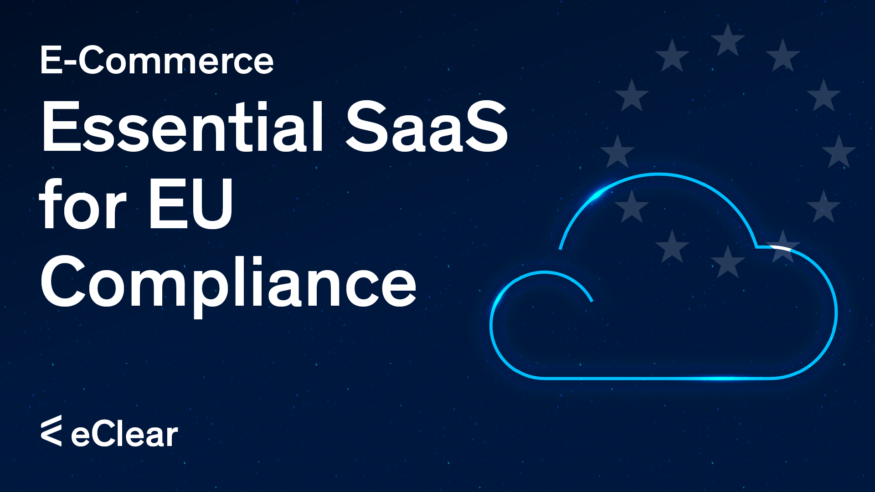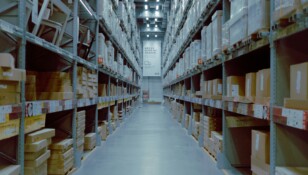In recent years, the European Union has imposed substantial fines on companies for non-compliance with various trade regulations, including data protection and competition laws. These penalties underscore the critical importance of adhering to compliance standards in European trade. Failing to comply not only results in hefty fines, but can also severely damage a company’s reputation and operational efficiency.
To navigate the complex landscape of European trade compliance, businesses are increasingly turning to Software as a Service (SaaS) solutions. These platforms, especially those provided by industry leaders like eClear, are essential for ensuring compliance, streamlining processes, and mitigating risks. eClear’s suite of compliance-focused SaaS solutions offers automated, efficient, and reliable ways to manage various aspects of trade regulations, making it an indispensable tool for cross-border commerce professionals.
Understanding Compliance in European Trade
In European trade, compliance refers to adhering to the rules, regulations, and standards set by governing bodies to regulate trade activities. This includes ensuring that all business operations, from import and export processes to data management and financial transactions, meet the legal requirements of the European Union (EU) and individual member states. Compliance is not only about following laws but also about maintaining ethical practices, fostering transparency, and upholding the integrity of business operations.
Compliance is crucial for businesses operating in Europe for several reasons:
- Avoidance of Legal Penalties: Non-compliance can result in severe penalties, including fines, sanctions, and restrictions on business activities. The EU has stringent enforcement mechanisms, and businesses violating trade regulations can face substantial financial and operational setbacks.
- Reputation Management: Compliance helps build and maintain a positive reputation. Businesses that adhere to regulations are considered trustworthy and reliable by customers, partners, and stakeholders, which can lead to increased customer loyalty and business opportunities.
- Operational Efficiency: Ensuring compliance can streamline operations by standardizing processes, reducing errors, and avoiding disruptions caused by regulatory breaches. This leads to smoother, more efficient business operations.
- Market Access: Compliance is often a prerequisite for entering and operating in different markets within the EU. Meeting regulatory requirements can open doors to new markets and customer bases, fostering business growth.
Key Regulations and Requirements
European trade is governed by a complex framework of regulations that businesses must navigate to ensure compliance. Some key rules include:
- General Data Protection Regulation (GDPR): This regulation focuses on data protection and privacy for all individuals within the EU. It imposes strict rules on how businesses collect, store, and manage personal data, protecting individuals’ privacy rights.
- Value Added Tax (VAT) Regulations: VAT is a consumption tax applied to goods and services in the EU. Businesses must comply with VAT regulations, which involve registering for VAT, charging the correct VAT rates, and accurately reporting and remitting VAT to tax authorities.
- Customs Laws: These laws regulate the import and export of goods within and outside the EU. Compliance with customs laws involves accurate classification of goods, proper documentation, payment of duties, and adherence to import/export restrictions.
The regulatory landscape in the EU is dynamic, with frequent updates and changes. Some recent developments include:
- Brexit-Related Changes: The UK’s exit from the EU has led to new trade agreements and regulations affecting businesses trading between the UK and EU member states. These changes require businesses to adapt compliance strategies to new customs procedures and VAT rules.
- E-commerce VAT Reforms: As of July 2021, the EU implemented new VAT rules for e-commerce, including introducing the One-Stop Shop (OSS) and the Import One-Stop Shop (IOSS) schemes. These reforms aim to simplify VAT compliance for online businesses and ensure fair taxation across member states.
- Sustainability Regulations: The EU increasingly focuses on sustainability, with new regulations to reduce environmental impact and promote sustainable business practices. Compliance with these regulations involves adhering to standards related to waste management, carbon emissions, and sustainable sourcing.
Challenges of Compliance in European Trade
European trade regulations are inherently complex due to the multifaceted legal frameworks established by the EU and its member states. Each country within the EU may have its own specific set of rules, procedures, and compliance requirements that businesses must adhere to, creating a highly variable regulatory environment. For instance, VAT rates and reporting requirements can differ significantly between Germany, France, and Italy, requiring businesses to stay abreast of numerous localised regulations.
The variability in compliance requirements across different European countries can pose significant challenges for businesses engaged in cross-border trade. These challenges include:
- Diverse Legal Systems: Each member state has its legal system and regulatory authorities, meaning businesses must navigate different legal landscapes and administrative procedures.
- Language Barriers: Regulations and compliance documents are often available only in the local language, necessitating translation and interpretation, which can introduce errors and delays.
- Frequent Updates: Regulations are updated to reflect economic, political, and social changes. Keeping track of these updates requires continuous monitoring and adaptation.
- Sector-Specific Regulations: Certain industries, such as pharmaceuticals, food, and electronics, face additional sector-specific regulations that complicate compliance efforts.
Consequences of Non-Compliance
Failing to comply with European trade regulations can have severe repercussions for businesses, impacting them legally, financially, and reputationally. The potential consequences include:
- Legal Risks:
- Fines and Penalties: Non-compliance can result in substantial fines and penalties imposed by regulatory authorities. These financial penalties can be crippling, particularly for small and medium-sized enterprises.
- Legal Actions: Persistent or severe non-compliance may lead to legal actions, including lawsuits, which can be costly and time-consuming.
- Operational Restrictions: Regulatory bodies may restrict business operations, including suspending trade activities until compliance issues are rectified.
- Financial Penalties:
- Increased Costs: Non-compliance can lead to additional costs, including legal fees, increased insurance premiums, and higher operational expenses to address compliance gaps.
- Loss of Revenue: Businesses may experience revenue loss due to halted operations, contract losses, or the inability to enter specific markets because of non-compliance issues.
- Reputational Damage:
- Loss of Trust: Customers, partners, and stakeholders may lose trust in a business that fails to comply with regulations, leading to a damaged reputation.
- Negative Publicity: Non-compliance incidents can attract media attention, harming the company’s image and brand value.
- Reduced Competitiveness: A damaged reputation can make it challenging to attract new customers and retain existing ones, reducing the company’s competitiveness in the market.
What is SaaS?
Software-as-a-Service (SaaS) is a cloud-based service model in which software applications are delivered over the Internet. Instead of purchasing and installing software on individual computers or servers, businesses access applications via a web browser. This model allows on-demand software access, typically through a subscription-based model.
SaaS platforms offer a range of functionalities that make them highly adaptable and user-friendly for businesses of all sizes. Key features include:
- Accessibility: With internet connectivity, users can access the software from any device, enabling flexibility and remote work capabilities.
- Scalability: SaaS solutions can quickly scale up or down based on the user’s needs, accommodating business growth or contraction without significant additional investment.
- Automatic Updates: The service provider manages Software updates and maintenance, ensuring users can access the latest features and security enhancements without manual intervention.
- Integration: SaaS applications often integrate seamlessly with other software systems and services, allowing for streamlined workflows and data sharing.
- Subscription-Based Pricing: SaaS typically operates on a subscription model, providing businesses with predictable costs and reducing the need for significant upfront investments in software.
Benefits of Using SaaS for Compliance
- Compliance Automation and Efficiency: SaaS solutions bring significant automation and efficiency to compliance management tasks, which can otherwise be labour-intensive and prone to errors. These solutions automate routine compliance tasks such as data collection, reporting, and auditing, reducing the need for manual intervention and minimising the risk of human error.
- Real-Time Compliance Updates: One of the most critical benefits of SaaS for compliance is its ability to provide real-time updates. Regulations and compliance requirements can change frequently. SaaS platforms ensure that businesses are constantly working with the most current information. Real-time updates mean regulation changes are quickly incorporated into the system, helping companies stay compliant.
- Centralised Compliance Data Management: SaaS platforms offer centralised data management, which is essential for maintaining comprehensive and accurate compliance records. Centralised systems allow for better data consistency, easier access to historical records, and more efficient data analysis. This centralisation also supports robust reporting capabilities, making it easier to generate compliance reports for regulatory authorities.
eClear’s Compliance Solutions
| Solution | Description | Key Benefits |
|---|---|---|
| CheckVAT ID | Fully automated and audit-proof solution for verifying VAT IDs of EU trading partners. Ensures accurate and reliable validation of VAT numbers across the EU27. |
|
| ClearCustoms EU | It simplifies importing low-value goods into the EU by providing full-service customs clearance. Ensures compliance with EU customs regulations and enhances operational efficiency. |
|
| ClearVAT® | Automates VAT clearing within the EU-27, ensuring 0% VAT for cross-border sales. Integrates seamlessly with checkout processes, simplifying VAT compliance. |
|
| VATRules® | This service automates determining and maintaining VAT rates for the EU-27 and other regions, ensuring accurate VAT rate application and minimizing compliance risks. |
|
| CustomsAI® | Offers automated customs tariff classification for your entire product inventory, enhancing efficiency and accuracy in managing customs compliance. |
|
| FileVAT® | It provides efficient VAT compliance management through a single portal connected to 30 tax authorities. It centralizes and automates VAT reporting, enhancing transparency and collaboration. |
|
Choosing the Right SaaS Solution for Compliance
When selecting a SaaS solution for compliance, several critical factors must be considered to ensure that the platform meets your business needs and regulatory requirements.
Scalability:
- Future Growth: Ensure the SaaS solution can scale with your business. It should accommodate increased data volume, users, and compliance requirements as your business expands.
- Flexibility: Look for solutions that offer flexible subscription models, allowing you to adjust your usage and costs as needed.
Security:
- Data Protection: Compliance-related data is sensitive. The SaaS provider must adhere to strict data security standards, including encryption, access controls, and regular security audits.
- Regulatory Compliance: The provider should comply with relevant data protection regulations, such as GDPR, ensuring your data is handled following legal requirements.
Customisation:
- Business Needs: The solution should offer customisation options to align with your specific compliance processes and workflows.
- Integration Capabilities: It should seamlessly integrate with your existing systems (e.g., ERP, CRM) to provide a unified compliance management platform.
User Experience:
- Ease of Use: An intuitive user interface and user-friendly features can significantly enhance adoption and efficiency.
- Support and Training: Ensure the provider offers comprehensive support and training resources to help your team effectively use the solution.
Vendor Evaluation
Selecting the right SaaS vendor is crucial for the success of your compliance efforts. Here are some tips for evaluating and comparing different SaaS vendors, focusing on eClear’s offerings.
Reputation and Expertise:
- Industry Experience: Look for vendors with a proven track record in compliance solutions. eClear, for instance, has extensive experience in providing compliance-focused SaaS solutions tailored to European trade.
- Client Testimonials: Check for client testimonials and case studies demonstrating the vendor’s success in addressing similar compliance challenges.
Feature Set:
- Comprehensive Solutions: Evaluate the vendor’s range of features. eClear provides a suite of solutions, including CheckVAT ID, ClearCustoms EU, ClearVAT®, VATRules®, CustomsAI®, and FileVAT®, each addressing specific compliance needs.
- Innovation: Consider vendors continuously innovating and updating their solutions to keep pace with changing regulations and technological advancements.
Support and Service:
- Customer Support: Assess the quality and availability of customer support. eClear offers robust support services, including dedicated account managers and technical support.
- Training and Resources: Ensure the vendor provides adequate training resources, such as tutorials, webinars, and documentation, to help your team effectively use the solution.
Cost and ROI:
- Transparent Pricing: Look for transparent pricing models that align with your budget. eClear’s solutions offer various subscription plans tailored to your business size and needs.
- Return on Investment (ROI): Evaluate the potential ROI by considering how the solution can reduce compliance costs, minimise risks, and improve operational efficiency.
Future Trends in SaaS and Compliance
Artificial intelligence (AI) and machine learning (ML) are set to revolutionise compliance by introducing advanced data analysis, pattern recognition, and predictive analytics capabilities. These technologies can significantly enhance compliance functionalities by automating complex tasks and providing in-depth insights into compliance data.
- Predictive Analytics: ML algorithms can analyse historical compliance data to predict potential compliance issues before they arise, allowing businesses to address risks proactively.
- Automated Document Processing: AI-powered tools can automate the processing and analysis of large volumes of compliance documents, ensuring accuracy and efficiency.
- Anomaly Detection: AI can continuously monitor transactions and activities, detecting unusual patterns or anomalies that may indicate non-compliance or fraud.
- Personalised Compliance Solutions: AI can tailor compliance solutions to a business’s needs, offering personalised recommendations and actions based on the unique regulatory environment and operational context.
- Continuous Learning: ML systems can continuously learn from new data and regulatory changes, ensuring compliance solutions remain up-to-date and effective.
- Unified Compliance Platforms: Businesses will benefit from SaaS solutions integrating various compliance functions, such as VAT reporting, customs clearance, and data protection, into a single platform. This integration reduces complexity and enhances efficiency.
- API-Driven Connectivity: APIs (Application Programming Interfaces) will become more prevalent, allowing different SaaS applications to communicate and share data effortlessly. This connectivity enables businesses to build customised compliance ecosystems tailored to their needs.
- Real-Time Data Sharing: Interoperable SaaS solutions will facilitate real-time data sharing across different systems and departments, ensuring compliance information is always current and accessible.
- Collaborative Compliance Networks: As interoperability improves, businesses will be able to collaborate more effectively with partners, suppliers, and regulatory bodies through interconnected compliance networks.
- Enhanced User Experience: Integration will lead to more intuitive and user-friendly compliance platforms, simplifying the user experience and reducing employees’ learning curve.
- Scalability and Flexibility: Interoperable SaaS solutions will offer greater scalability and flexibility, allowing businesses to quickly expand their compliance capabilities as they grow or as regulatory requirements change.
Staying compliant in the complex landscape of European trade is not just a legal necessity but a strategic advantage.
We encourage you to explore eClear’s SaaS solutions for your compliance needs. Whether you need to deal with VAT reporting, customs clearance, or overall regulatory compliance, eClear offers tailored solutions to streamline your processes and ensure adherence to European trade regulations. Partner with eClear to stay ahead of regulatory changes and protect your business from compliance risks.
Let’s stay in touch!
Stay up to date on the latest market trends, best practices and regulatory changes affecting cross-border trade by following us on LinkedIn.







